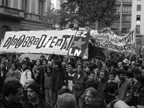On
10 July 2003, Big Hope: Miklos Erhardt and Dominic Hislop, recorded
a telephone interview with Elio Gilardi,
a member of the creative 'Pink' group within the Torino Disobbedienti,
for the programme 'Protest Songbook', broadcast on Radio Helsinki, Graz
on 11 July 2003.

Big
Hope: Can you think of any songs that somehow either helped shape your
own political consciousness or was a good reflection of your existing
views?
Elio
Gilardi: Well, at the moment the creativity group that started in Genova,
has changed its approach a bit. Now we are working on samba. Samba began
in Brazil, amongst the slaves, as a method of protest - taking to the
streets. So that historical element is one of the reasons for doing
it. Also, we can't imagine any songs or music other than samba, that
can be so communicative, can as effectively bring people together in
politics and action, so we have decided that for the moment at least,
playing samba songs is a good way of demonstrating.
BH:
What do you think of traditional protest songs where the lyrics are
full of poetic or even direct political commentary or reflection or
are trying to encourage people to take some political action?
EG:
We don't play those kind of songs anymore. These days, I don't think
they're very effective in involving people, making them feel like taking
action or participating. Certainly, in my life, they're really not so
important. I mean they are good to play at home, but not good for activism
and actions anymore.
BH:
However, Italian traditions in this field are strong, as there is the
huge tradition of ‘cantautori’, with its very powerful and
popular songs with more or less direct political content. Have these
songs ever been used for activist purposes, or sung together at demos?
EG:
The tradition of these politically conscious cantautori and songs goes
back to the war of liberation in 1945. Ever since then they have been
sung by loads and loads of people and we still play these songs. They
are a really strong means of preserving the history and consciousness
of the war of liberation and the subsequent leftist movement. Over the
last few years, we have played them from a truck with a big sound system
at every single demonstration. Songs like 'Bella Ciao' for example.
People still feel something when they hear these songs, so this tradition
isn't over, it's still strong.
BH:
I think that the fact that you consider samba to be a good way of demonstrating,
must be a sign of a big change in the attitude of people towards political
actions, as I suppose that samba is not based on the content but much
more on the capacity of music to create a community, or to make people
to feel good together.
EG:
You're right, it is much more of a method, much more of a practice,
a music that makes you feel the revolution inside yourself, rather than
stimulating your analytical thinking. So it's completely different from
our tradition of revolutionary songs.
BH:
That is to say it is not about that kind of revolution anymore?
EG:
It's more a way of expressing yourself, of being creative in political
actions. Those songs we were talking about are a tool that make you
feel part of a history, part of a big group, where everybody is listening
to the same songs and everybody feels the same way, about being revolutionary
people. Samba is a way of communicating with other people, it's a way
of creating unity and at the same time being creative, because it's
not just samba, it's samba combined with action. It's certainly a different
thing to express yourself by singing at a demonstration. As the Disobbedienti
did a few years ago when setting up of the 'theatre of conflict' with
the police, incorporating samba creates a different way to express ourselves.
It's important for our continuation to change the way of creating these
conflicts. But one thing should be clear: Disobbedienti is a huge movement,
a national network of groups and ours is just a small group that is
related to Disobbedienti, but we are not The Disobbedienti. So
concerning the overall strategies of the movement, they are discussing
the levels of violence, conflict and communication, but when I'm talking
about samba and creative strategies, I'm just referring to the small
creative group within the Torino Disobbedienti that I'm involved with
at the moment.
BH:
In creating a situation in the street that grabs public attention, using
props - that being the 'prop maker' of Torino Disobbedienti - have quite
often been made by you, a lot of the actions of the Disobbedienti have
the appearance of what are important performance actions in art history.
I'm just wondering how you see that relation to a history of politically
motivated performance in contemporary art or, if you're familiar with
the actions inspired by the Situationists, whether you consider your
activism to be a kind of socially engaged art practice?
EG:
Well, I'm no expert in art. I know that, especially in the 60s and 70s,
artists directed a lot of attention towards social problems and made
art in the street. That expanded our idea of where we can express ourselves
in a creative way and from then, I think, art is quite often seen on
the streets. This can be a direct inspiration to more people to be active
in expressing their own ideas too.
Elio
Gilardi is a member of the creative 'Pink' group of the political activist
group, Torino Disobbedienti.
Click here to read the full
version of the interview.